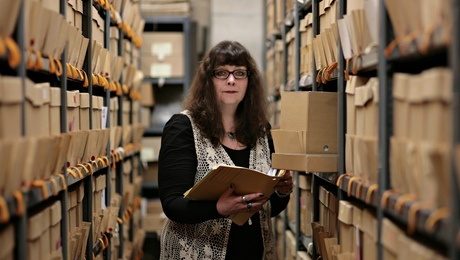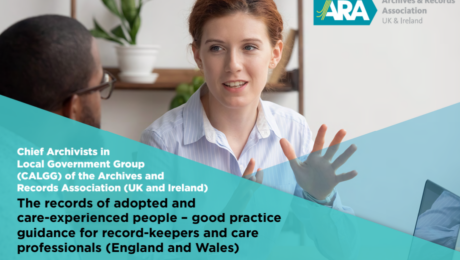Care Leavers Association Publish Video Guide
All the referrals for action accessing Care Records are funnelled through the Care Leaver’s Association in Manchester. If you fill in our contact form, it is forwarded to them for help. In order to provide guidance, they have published a guide which you can watch below. For a full description and more detail, go to this link – https://www.careleavers.com/what-we-do/access-to-records/
- Published in General
Archives & Records Association launch new paper on the need for better access to records for care leavers.
Today marks the launch and publication of a new paper on better access to records for care leavers and the adopted. It is the result of a project lasting from November 2022 to March 2024, endorsed by a member of our association, Baroness Lola Young. Some members of our committee will be attending in eager anticipation of the launch in London at Bevin Hall, close to the Houses of Parliament. Three of our committee members, Dr.Julia Feast OBE, Dr. Jim Goddard and Isa Jaye contributed to the project personally.
To quote the introduction to the project:-
The guidance has been created as part of a project led by members of the Chief Archivists in Local Government Group (CALGG) who are part of the Archives and Records Association (United Kingdom and Ireland). An Advisory Group consisting of adopted and care experienced people, social work practitioners, and information/ data protection practitioners has guided the project …. Funding was received from The National Archives, the Welsh Government and from CALGG members.
The report is divided into several parts
- Creating records
- Managing and preserving records
- Providing access to records
- Summary of statutory guidance and minimum standards
It is argued that there should be parity between adoption records, and care records in that there is no statutory rule as to how long records should be preserved for those care leavers who have not been adopted. A fixed period of between 125 and 150 years is proposed, in order to last beyond the lifetime of most, and give the relatives of any deceased some clue as to their parents life, if indeed they are to be permitted to have access. The difficulties with access to records by the relatives of the deceased is highlighted
Mention is made of ensuring that if digitised, continued access to whatever format is used should be made possible both backwards and forwards in time. Tracking records centrally is recommended so that their location many years thereafter is not lost with time. Historically this has often been a problem, particularly during devolution of local authorities years ago, and the re-organisation of boundaries.
Examples of good and exemplary policy under all headings is conveniently given.
The old chestnut of redaction, and the need to keep it to a minimum for care-experienced people is underlined once again. The clamour for secrecy and ever increasing efforts to hide personal data from the prying eyes of the public/media works against the needs of the care leaver/adopted person to know about their personal history in detail.
The trauma involved in reading one’s records for the first time in detail is covered with recommendations for trauma training by those supervising access. The worst policy of a box of disorganised bits of paper is hopefully a thing of the past.
Finally, to quote Baroness Young
The CALGG led project has brought into sharp focus the necessity to ensure the longevity and preservation of these unique archives of care experienced and adopted people. We can think of these records as being very personal, because of course they are. But they are also of wider historical significance and an invaluable resource. They give texture to the story of society’s attempts to provide substitute families in circumstances where birth parents are not able to provide a nurturing, secure environment for their children.
To access a copy of the full report, click here
- Published in General, Press Releases
ICO calls for people to share experiences accessing care records as it vows to improve support
The Information Commissioner’s Office (ICO) is calling on people with experience of the care system in the UK to share the challenges they have faced when accessing their care records from organisations.
With a survey launched today, the UK data protection regulator is committing to improving the support it provides to both people with care experience and the organisations that hold their information.
The ICO recognises that records of personal information are especially important to people who have care experience, often revealing elements of their childhood history which they cannot recall. Under data protection law, everyone has rights over their own personal information. This includes the right to ask for this information using a subject access request (SAR) but for people with care experience, this can be a lengthy and stressful process.
Last year, the ICO ran workshops with organisations who support people with experience in the care system. The workshops identified that accessing care records is a significant issue with long delays, heavily redacted records and challenges accessing support. The insight revealed that organisations can
struggle to understand what information they can release from complex records and often fail to treat these requests with the sensitivity they require.
It also highlighted that the regulator could do more to help people with care experience obtain their personal information and exercise other information rights, as well as support organisations to provide timely responses. In response to the concerns raised, the ICO is now urging people with care experience in the UK to come forward to share their experiences, both requesting their records and having their personal information handled in the care system.
The information gathered about the impact of delays, redactions and other concerns will help the ICO identify areas where it can focus its support.
Catherine Evans O’Brien, Head of Communities at the ICO, said: “Accessing care records can be an emotive and personal subject, as the information can play a huge role in helping someone to understand their identity. As the UK data protection regulator, we want to empower people to exercise their rights over their own personal information and we want to improve the support and resources we provide to help people understand these rights.
“This survey is a major step towards improving the experience of accessing personal information for people who have been in the care system. As well as experiences trying to access records, we want to hear about any concerns people have about how their personal information has been used, so we can
understand where we can make the most difference with our support.”
“This survey is a major step towards improving the experience of accessing personal information for people who have been in the care system. As well as experiences trying to access records, we want to hear about any concerns people have about how their personal information has been used, so we can
understand where we can make the most difference with our support.”
The ICO has also been engaging directly with local authorities in Scotland to improve response times where it has identified poor performance handling requests for care records. In Scotland, many local authorities have seen an increase in SARs, especially since the Redress Scheme requires people to provide
care records when applying for redress for abuse suffered while in care.
Jenny Brotchie, Regional Manager for Scotland at the ICO, said:
“We have heard how undue delays and other challenges accessing care records can cause further trauma for people in Scotland. Organisations must get this right which is why we are closely monitoring local authorities until we are satisfied that their compliance has significantly improved.”
Using the insight gathered from both workshops and the survey, the ICO will produce updated resources for all UK organisations, providing clarity on how they can improve their processes when handling requests for care records and protect the personal information of people with care experience.
If you have experience accessing your care records, please share details with the ICO please share details with the ICO here.
You can read more about the ICO’s work with local authorities in Scotland here.
Find out more about your information rights on the ICO’s website.
- Published in General, Press Releases



